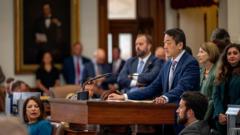In the past two decades, more than 5 million households across the United States—from California to Georgia to Maine—have opted for rooftop solar panels to harness solar energy and lower their electricity costs. However, this trend may be facing an abrupt end. Last month, House Republicans passed a significant domestic policy bill that aims to terminate tax credits for homeowners and solar leasing companies, which have been instrumental in boosting the popularity of solar installations. If this legislation becomes law, experts predict a substantial downturn in solar installations.
“This sets us back,” remarked Ben Airth, policy director at Freedom Forever, a leading residential solar installer in the country. He reflected on his 22 years in the industry, recalling when solar panels were primarily adopted by affluent individuals and environmentally conscious enthusiasts. Analysts at Ohm Analytics, an energy data firm, estimate that residential solar installations could decline by 50% in just one year if the House bill is enacted. Without the tax credits, homeowners would need about 17 years to recover their solar investments.
A more dire forecast from Morgan Stanley suggests rooftop solar demand could plummet by 85% by 2030. While Republicans are also targeting tax incentives for other renewable energy technologies, such as wind energy and large-scale solar farms, rooftop solar may suffer more severely due to its higher cost per unit of electricity and dependency on subsidies.
As the Senate crafts its version of the domestic policy bill, solar industry leaders have flocked to Washington to advocate for a gradual reduction in energy credits. They stress that the solar sector sustains approximately 300,000 jobs and that rooftop solar systems play a key role in helping homeowners economize on their electricity expenses.





















